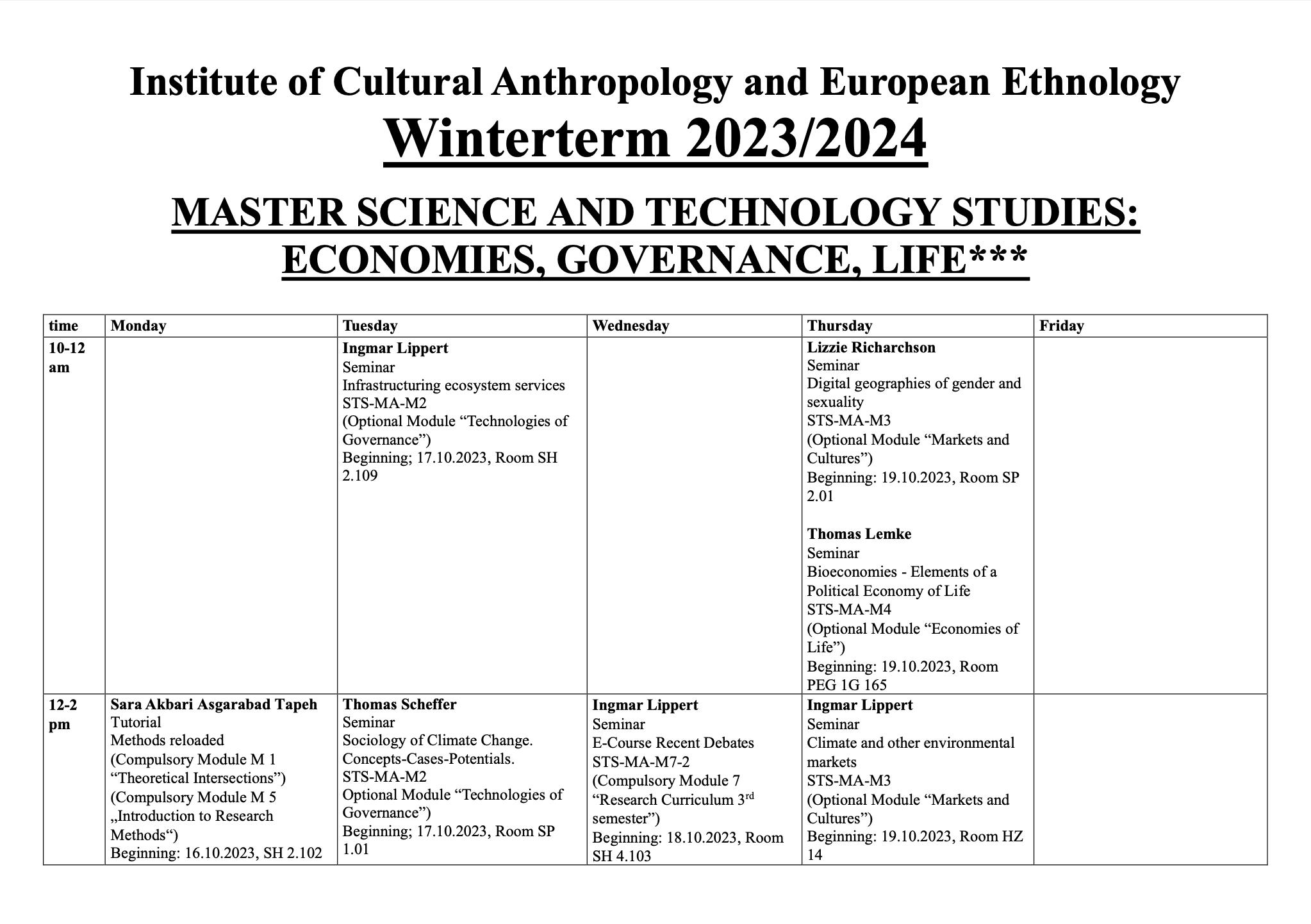Institute News
Here you will find current news from the institute. Also have a look at our Events page. STS student scan find all information about the implementation of their studies including deadlines and dates under For MA Students.
Winter Term 2023/24

I see something you don't see: Knowledge politics of digital infrastructures. Judith Blume (Collection Coordination, Frankfurt University Library), Matthias Harbeck (FID Social and Cultural Anthropology / University Library, Humboldt-Universität zu Berlin), Ingmar Lippert (Institute for Cultural Anthropology and European Ethnology, University of Frankfurt) How do digital and digitizing infrastructures make knowledge visible or invisible, what is known through them, what is not, and with what consequences? We will discuss these questions in three cases: a wild museum between industry and autochthonous people in Germany, the presentation of collections and objects in various portals and databases of the Frankfurt University Collections, and the examination of the digitization of "difficult" materials (including those from colonial contexts) in the Specialized Information Service for Social and Cultural Anthropology. What visions of digital infrastructures can be developed from these three examples?
Winter Term 2023/24
You are kindly invited to attend a public lecture on disasters, offered by Dr. Malka Older from Arizona State University on Tuesday, 17. October, 6 pm (ct) in room PEG 2G.107.
Malka Older is a writer, aid worker, and sociologist. After working in international assistance and disaster response for more than a decade, she completed her doctorate in the sociology of organizations at Sciences Po. Her academic writing focusses primarily on disaster response, temporality, and geopolitics. Her science-fiction political thriller Infomocracy was named one of the best books of 2016 by Kirkus, Book Riot, and the Washington Post, while her latest book, The Mimicking of Known Successes, was a most anticipated pick for Today.com, Buzzfeed, Polygon, Book Riot, and Ms. Magazine.
The lecture will address disaster presents and disaster futures, focussing on how disasters, with their compressed time frames and often intense documentation and scrutiny, offer clues for better collaboration and the pitfalls of desperation. No registration is required. We are looking forward to your numerous attendance.

Winter Term 2023/24
Bachelor - Cultural Anthropology and European Ethnology (CAEE) - First Year
Timotheus Kartmann / Ingmar Lippert: BA Orientation Course, 16.10.2022,
Time and place: 2-4 pm, room CAS 1.812
Gisela Welz / Martina Klausner: MA STS Orientation Course, 17.10.2023
Time and place: 2-4 pm, room IG 1.515
Winter Term 2023/24
Winter Term 2023/24
Dr. Katharina Graf's latest publication is entitled "Cyborg Cooks: Mothers and the Anthropology of Smart Kitchens".
Titel: Cyborg Cooks: Mothers and the Anthropology of Smart Kitchens
Journal: Digital Culture & Society Vol 9(1): 49-70.
DOI: https://doi.org/10.14361/dcs-2023-090104
Link to article
Abstract: Future kitchens are increasingly imagined as smart. Wired food processors offer a choice of recipes and prepare food for busy cooks while smartphones or intelligent fridges promise to shop online autonomously. Whatever the futuristic image, so-called “smart technology" is depicted as rescuing domestic cooks too busy or inexperienced to cook. Social anthropology is suspicious of such one-directional and hegemonic visions of technological impact on everyday life and ideally positioned to explore the entanglements of social, cultural, economic and political dimensions in increasingly digitally mediated human-machine interactions in the home. Yet, an ethnographic understanding of how humans and kitchen technologies interact in this rapidly changing context is surprisingly scarce. In this research paper I address this gap from an anthropological perspective on domestic food practices in urban and rural Germany through the feminist notion of the cyborg cook. In doing so, I engage with and challenge the above futurist visions as well as scholarly debates around the smart home and the domestication of digital technologies. I draw on multisensory participant observation of domestic cooks' interactions with the digital kitchen robot Thermomix to demonstrate that smart kitchens are already a reality and that cyborg cooks are firmly established among us. I argue that especially mothers should be considered as early adopters of digital technologies in diverse domestic kitchens and contest the assumptions in futurist visions and in the literature that women, including those from cultural or class minorities, are tech-averse marginal users.

- Studying at Goethe University
- International applicants
- Faculties
- Overview of study programmes
- Programme for refugees
- GRADE
- Goethe Business School (continuing education)
- Research at Goethe University
- Scientific news
- Goethe Welcome Center (for international researchers)
- Collaborative research projects
- Individual research
- Visiting fellowships
- Endowed chairs
- About the University
- News-in-brief
- University administration
- Campus locations
- Campus life
- University archives (German)
- Rhine-Main-Universities








